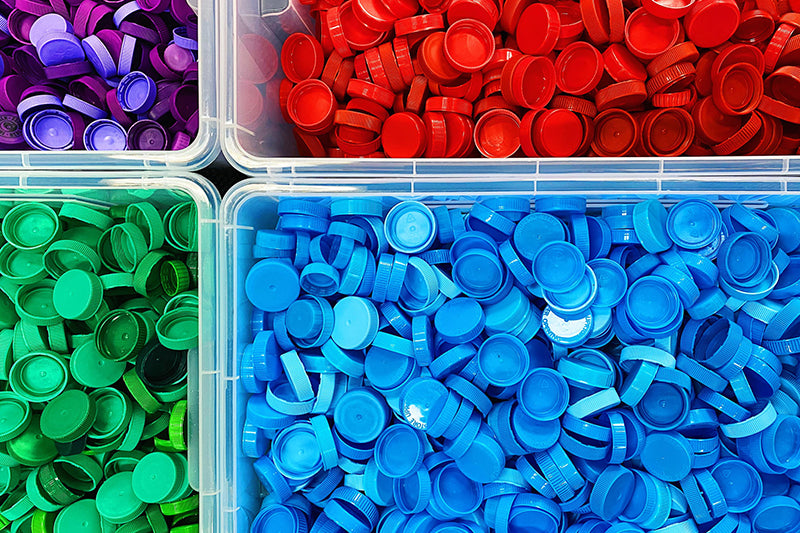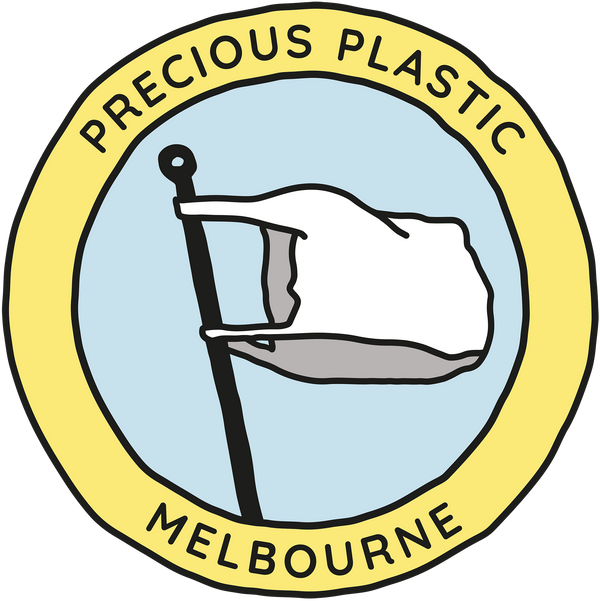Plastic bottle tops - these cheeky little fellas sure can cause some confusion when it comes to how they can be disposed of responsibly. So much so, that our inbox is frequently inundated by questions on the subject on the daily! Below, we fill you in on some common questions and misconceptions to get you well on your way to sustainable disposable of this (extremely useful and valuable!) resource.

Why bottle caps can't be recycled through your home recycling bin
In many Australian councils, plastic bottle tops must be separated from bottles before being placed in the recycling bin. Bottle tops are too small to be accurately sorted at most Materials Recycling Facilities (MRFs), and if placed loose within your kerbside recycling bin, often end up contaminating the recycling mix or jamming the sorting machinery. Unfortunately, this has meant that up until recently, plastic bottle caps have had to be disposed of alongside general household waste, keeping the 'non-recyclable' material out of the recyclable waste stream.

Enter the Envision Hands program
In 2019, community charity initiative Envision Hands was created with the vision to turn discarded plastic bottle caps into interim mobility aids (prosthetic limbs) for children.
The first phase of the project (bottle cap collection) was hugely successful, with the collection of over 5,000,000 bottle caps in Victoria and another 10,000,000 collected interstate.
However, towards the end of 2019, Envision paused donations, before putting out a call out-to stop the flow of lids entirely, and released the following statement to advise of complications in production and quality assurance. "Despite our best efforts, the children’s mobility aids that we have produced from recycled bottle caps have not met our internal quality standards. Regrettably, Phase Two of the project will cease, and we will no longer seek support for the Envision Hands project."

A grassroots micro-recycling movement provides a circular solution
With Aussies around the country diligently collecting lids in the thousands, not long after we established Precious Plastic Melbourne we were contacted by Envision, and met with their founder Sean Teer to arrange the handover of around 300,000 lids, and to redirect the never-ending flow of incoming plastic waste to our micro-recycling workshop in the eastern suburbs of Melbourne.
For the following 4 years, we were able to provide a sustainable solution for Lids4Kids, diverting a valuable resource from landfill, and maintaining the high value of the waste stream through repurposing the discarded lids into a range of useful products, such as plastic bricks, gardening tools, jenga blocks and more.

We were additionally honoured to produce a range of Zephyr Bros. recycling machinery and product moulds for the Lids4Kids team for use at their headquarters in Canberra.

How & where to donate your plastic lids
Here at PPM, we do not accept plastic directly from the public. Lids can be donated for recycling via the following channels:
- Your local micro-recycler - Check out the Machine locations on our Impact Map to find micro-recyclers in your area. You'll need to contact them directly to find out what materials they accept at their particular facility.
- Lids4Kids - Contact Lids4Kids directly (rather than PPM) for any lid donation or drop-off point related queries.
- BRAD (Banish) - The BRAD program accepts a wide variety of hard-to-recycle plastics. Contact Banish directly (rather than PPM) for any queries.
Which plastic lids can be accepted for recycling?
This may depend on your location, so your best bet is to touch base with your local program or micro-recycler to confirm what can and can't be accepted.
We've attached our general guide below, detailing which lids can be commonly worked with by micro-recyclers, and recycling requirements.
PPM Lid Recycling Guide:
- Lids labelled 2 or 4 only (if in doubt, keep it out!)
- Lids must be 100% clean (even a cheeky spec of dirt can contaminate a batch)
- Size no bigger than a milk lid
- Any inserts removed (and if not removable, remove from the batch)

Why micro-recycling?
Not only are micro-recyclers capable of recycling this 'tricky' waste stream, we're also committed to ensuring this highly versatile resource is upcycled into high quality items, that are also recyclable at end-of-life. You won't find any low grade, single-use, non-recyclable products at PPM - we not only believe that maintaining the integrity of this material is key to a successful circular economy for plastics, but that it also honours the time, effort, commitment and care that was put into the collection of all of these these little lids.

What can be done with plastic lids that can't be recycled?
What to do with those cheeky number 5's, unnumbered lids, or lids with adhered inserts on the inside?! Those leftover odd n' bods can still be reused through art and craft - try your local 'Reverse Garbage' organisation, schools or kindergartens.
Keen to do some lid crafting yourself? Here's some wonderful inspo to get you going!



64 comments
our medical center has been collecting lids for a while and i just want to know where to drop them off. i am located in hawthorn East or east bentleigh
Is there anywhere in Toowoomba that collects lids4kids
Hello I live in Newport Melbourne where can I drop off my clean bottle tops & bread tags?
Is there a lid recycling place in Bathurst
Thank you for this information. I have looked at the Lids4Kids FB and now have a place to drop off the lids.